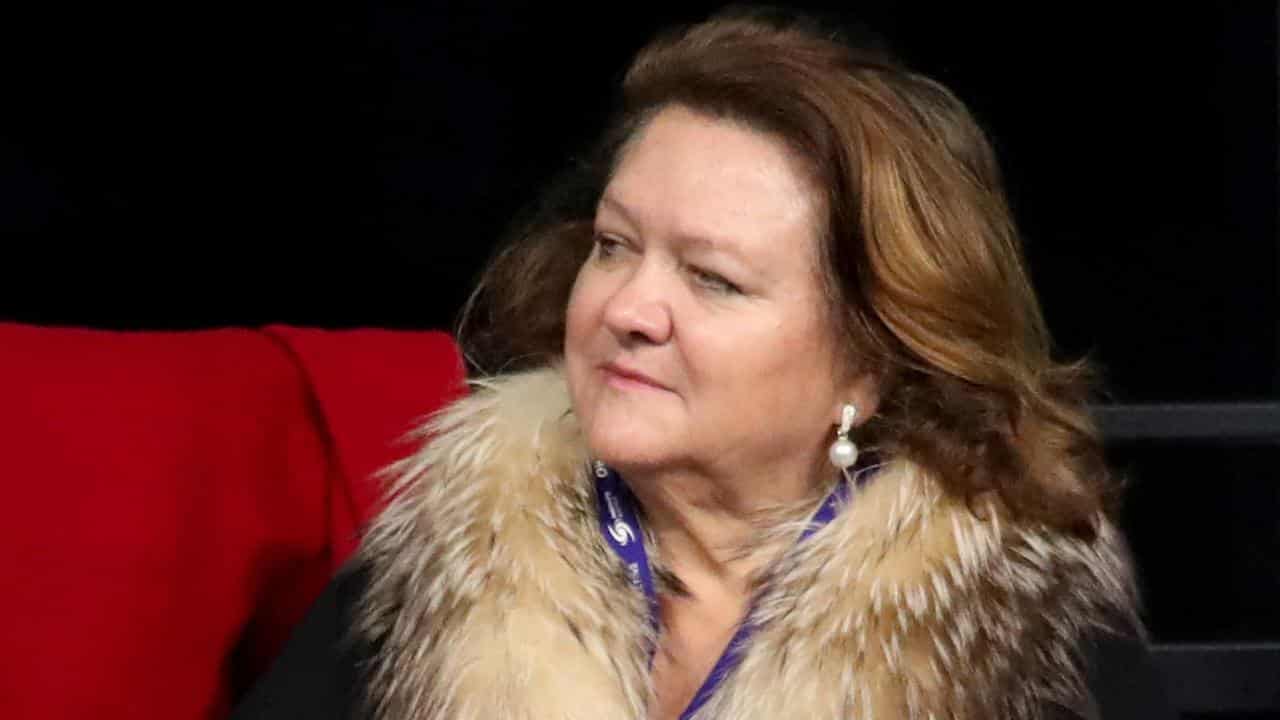
A slew of letters and personal emails revealing fraud allegations against billionaire Gina Rinehart and her son's early attempts to force a settlement to the unresolved family feud has been outlined to Western Australia's Supreme Court.
John Hancock used the knowledge he gained as director of various Hancock Prospecting entities against his mother as she fought Rose Porteous and worked to forge a deal with Rio Tinto that helped make her Australia's richest person.
"We begin to see John squarely raise allegations against Gina concerning the debt reconstruction in the 1990s," DFD Rhodes lawyer Simon Taylor told a complex legal case on Thursday over mining tenements about a 2003 letter between the pair.
In other correspondence read to the court, Mr Hancock threatened to sue his mother for allegedly stripping a trust of company assets, while agitating for compensation and promising not to go to the media over the bitter dispute.
When Mrs Rinehart triumphed over Mrs Porteous, Mr Hancock wrote to his mother: "I hope you will remember the effort I put in also, especially in turning the tide and the media, against the Porteous camp."
By 2004, Mr Hancock had emailed his three sisters advising them he was working on the legal case to have their mother removed as trustee and reclaim the "assets my grandfather (Lang Hancock) wanted to leave his grandchildren".
He later told his youngest sister Ginia Rinehart, who was a teenager at the time, that their mother had "stolen 33 per cent of the family company from us children".
"She has breached her fiduciary duties to the detriment of the beneficiaries and enriched herself," Mr Hancock said.
"Further she has removed tenements, including Hope Downs, from companies the children control."
The battle rolled into 2005 with Mr Hancock threatening to go to Angela Bennett - one of his pioneer grandfather's former business partner Peter Wright's children - for litigation funding and start legal action.
He later emailed Mrs Rinehart threatening to speak to the media.
"This was a critical time in the Hope Downs joint venture ... (Hancock Prospecting) was negotiating with Rio Tinto for (it) to acquire a 50 per cent interest in the project, including the tenements," Mr Taylor said.
By September, Mr Hancock had filed the case against his mother in court and Hancock Prospecting was finalising its deal with Rio Tinto.
The mining giant wasn't ignorant of the controversy surrounding the Hope Downs' tenements, raising concerns about assurance of title at a high-level meeting between Mr Rinehart and then chief executive Sam Walsh.
The family company of deceased prospector Don Rhodes wants 1.25 per cent royalty share of Hope Downs' production over an alleged deal with Lang Hancock and Mr Wright in which tenements were handed over in the 1960s.
The high-stakes stoush centres around Mr Wright's heirs, who are fighting through their company, Wright Prospecting, for a series of Hope Downs tenements and royalties.
Mrs Rinehart's company Hancock Prospecting is also represented, as are Mr Hancock and Bianca Rinehart, with about two dozen lawyers packing the Perth courtroom for the case that is expected to run until November.
The pair assert they are entitled to a hefty share in the Pilbara operation which they say defeats both Wright Prospecting and DFD Rhodes' claims.
The prospectors disagree, saying a trust interest in the shares of a company doesn't give them a legal right to the company's assets.
They also argue the siblings unreasonably waited too long to make their claim, which is currently in arbitration in another court and does not involve the prospectors
Hancock Prospecting is defending against the prospectors' claims and maintains it undertook all the work at Hope Downs and bore the financial risk involved in the development, and is the legitimate owner of the assets.









